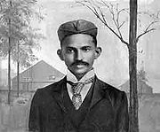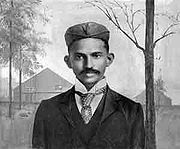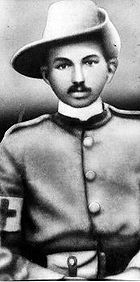
Mohandas Karamchand Gandhi in South Africa
Encyclopedia


South Africa
The Republic of South Africa is a country in southern Africa. Located at the southern tip of Africa, it is divided into nine provinces, with of coastline on the Atlantic and Indian oceans...
in 1893.
Gandhi arrived in South Africa in 1893 to work as a legal representative for the Muslim Indian Traders based in the city of Pretoria.
Gandhi's work in South Africa dramatically changed him, as he faced the discrimination commonly directed at black South Africans and Indians
Indian South Africans
Indian South Africans are people of Indian descent living in South Africa and mostly live in and around the city of Durban, making it 'the largest 'Indian' city outside India'. Most Indians in South Africa are descendents of migrants from colonial India during late 19th-century through early...
. One day in court at Durban
Durban
Durban is the largest city in the South African province of KwaZulu-Natal and the third largest city in South Africa. It forms part of the eThekwini metropolitan municipality. Durban is famous for being the busiest port in South Africa. It is also seen as one of the major centres of tourism...
, the magistrate asked him to remove his turban
Turban
In English, Turban refers to several types of headwear popularly worn in the Middle East, North Africa, Punjab, Jamaica and Southwest Asia. A commonly used synonym is Pagri, the Indian word for turban.-Styles:...
. In late May or early June 1893, he was thrown off a train at Pietermaritzburg
Pietermaritzburg
Pietermaritzburg is the capital and second largest city in the province of KwaZulu-Natal, South Africa. It was founded in 1838, and is currently governed by the Msunduzi Local Municipality. Its "purist" Zulu name is umGungundlovu, and this is the name used for the district municipality...
, in the Transvaal
South African Republic
The South African Republic , often informally known as the Transvaal Republic, was an independent Boer-ruled country in Southern Africa during the second half of the 19th century. Not to be confused with the present-day Republic of South Africa, it occupied the area later known as the South African...
, after refusing to move from the first class to a third class coach while holding a valid first class ticket. Traveling further on by stagecoach, he suffered other indignities on the journey as well. These incidents have been acknowledged by several biographers as a turning point in his life, his later social activism. It was while witnessing firsthand this racism
Racism
Racism is the belief that inherent different traits in human racial groups justify discrimination. In the modern English language, the term "racism" is used predominantly as a pejorative epithet. It is applied especially to the practice or advocacy of racial discrimination of a pernicious nature...
, that he heard of a bill in the Natal
Natal, South Africa
Natal is a region in South Africa. It stretches between the Indian Ocean in the south and east, the Drakensberg in the west, and the Lebombo Mountains in the north. The main cities are Pietermaritzburg and Durban...
Legislative Assembly curtailing the voting rights of local Indians. When he brought this up with his hosts, they lamented that they did not have the expertise necessary to oppose the bill, and implored Gandhi to stay and help them.In regards to this bill Gandhi sent out a memorial to Joseph Chamberlin, British Colonial Secretary, asking him to reconsider his position on this bill. He circulated several petitions to both the Natal Legislature and the British Government in opposition to the bill. Though unable to halt the bill's passage, his campaign was successful in drawing attention to the grievances of Indians in South Africa. Supporters convinced him to remain in Durban to continue fighting against the injustices levied against Indians in South Africa. He founded the Natal Indian Congress
Natal Indian Congress
The Natal Indian Congress was an organization that aimed to fight discrimination against Indians in South Africa. The Natal Indian Congress was started by Mohandas Karamchand Gandhi, later known as the Mahatma...
in 1894, with himself as the Secretary. Through this organization, he molded the Indian community of South Africa into a homogeneous political force, publishing documents detailing Indian grievances and evidence of British discrimination in South Africa. Gandhi returned briefly to India in 1896 to bring his wife and children to live with him in South Africa. When he returned in January 1897, a white mob attacked and tried to lynch him. In an early indication of the personal values that would shape his later campaigns, he refused to press charges against any member of the mob, stating it was one of his principles not to seek redress for a personal wrong in a court of law.
At the onset of the South African War, Gandhi argued that Indians must support the war effort
War effort
In politics and military planning, a war effort refers to a coordinated mobilization of society's resources—both industrial and human—towards the support of a military force...
in order to legitimize their claims to full citizenship, organizing a volunteer ambulance corps of 300 free Indians and 800 indentured labourers called the Indian Ambulance Corps, one of the few medical units to serve wounded black South Africans. He himself was a stretcher-bearer at the Battle of Spion Kop
Battle of Spion Kop
The Battle of Spion Kop was fought about west-south-west of Ladysmith on the hilltop of Spioenkop along the Tugela River, Natal in South Africa from 23–24 January 1900...
, and was decorated. At the conclusion of the war, however, the situation for the Indians did not improve, but continued to deteriorate. In 1908, the Transvaal government promulgated the Asiatic Registration Act, compelling registration of the colony's Indian population. At a mass protest meeting held in Johannesburg
Johannesburg
Johannesburg also known as Jozi, Jo'burg or Egoli, is the largest city in South Africa, by population. Johannesburg is the provincial capital of Gauteng, the wealthiest province in South Africa, having the largest economy of any metropolitan region in Sub-Saharan Africa...
on September 11 that year, Gandhi adopted his methodology of satyagraha
Satyagraha
Satyagraha , loosely translated as "insistence on truth satya agraha soul force" or "truth force" is a particular philosophy and practice within the broader overall category generally known as nonviolent resistance or civil resistance. The term "satyagraha" was conceived and developed by Mahatma...
(devotion to the truth), or non-violent protest, for the first time, calling on his fellow Indians to defy the new law and suffer the punishments for doing so, rather than resist through violent means. This plan was adopted, leading to a seven-year struggle in which thousands of Indians were jailed (including Gandhi himself on many occasions), flogged, or even shot, for striking, refusing to register, burning their registration cards, or engaging in other forms of non-violent resistance. While the government was successful in repressing the Indian protesters, the public outcry stemming from the harsh methods employed by the South African government in the face of peaceful Indian protesters finally forced South African General Jan Christiaan Smuts to negotiate a compromise with Gandhi.He did eventually release him
External links
- Satyagraha in South Africa by Mahatma Gandhi
- Satyagraha in South Africa

